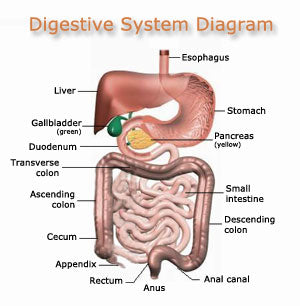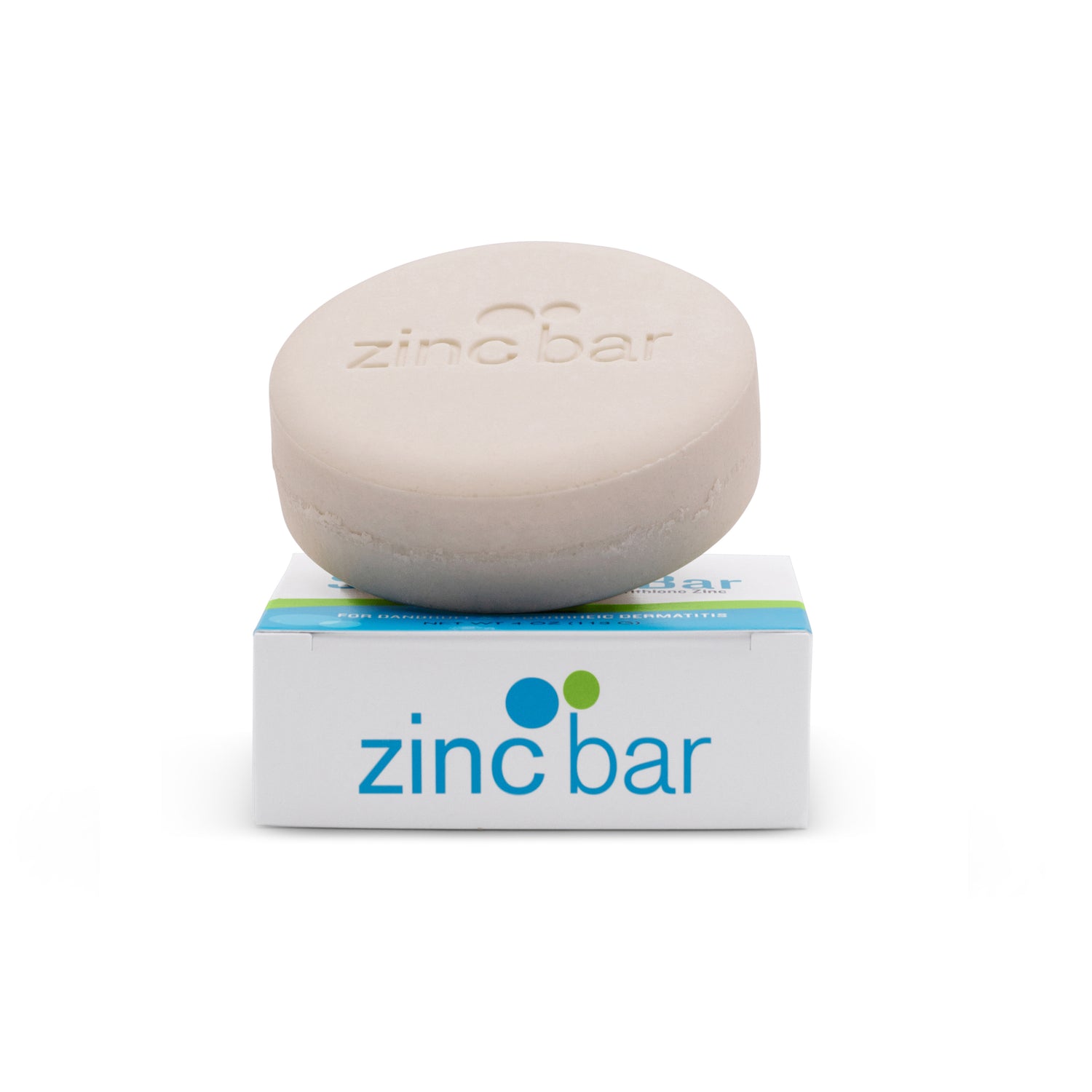Your Colon and Psoriasis
Overview
Recent studies have suggested that the health of the intestine and colon greatly affects psoriasis. "Leaky gut," also known as dysbiosis or intestinal permeability, is often associated with constipation, diarrhea, and irritable bowel syndrome (IBS). These imbalances may not only cause psoriasis to flare up, but also exacerbate a host of other autoimmune and inflammatory conditions. One chiropractic physician and psoriasis specialist, Dr. John Pagano, insists that psoriasis originates within the intestinal tract—and so does its remedy!
A good place to begin healing from the inside out is by learning how your intestinal tract works and to identify problems there that can affect the overall health of the body. We hope to teach you what you need to know about leaky gut and Dr. Pagano's concepts as they apply to psoriasis and skin health.

Our digestive tract begins with the mouth and stomach, continues with the small and large intestines, and ends with the colon. Good digestion begins with chewing your food well before swallowing, and eating slowly. Stomach, or gastric, health is very important as it begins the breakdown of food particles before they enter the intestines. Diagram of the human digestive systemYou may think the intestines are simply tubes for digested food to pass through, but in fact the intestinal tract and colon have very specific and important jobs that greatly influence our health and skin in many ways!
The small intestine averages 15-20 feet in length, and is divided into three sections: the duodenum, the jejunum, and the ileum. The small intestine digests and absorbs various nutrients from food as it passes over microscopic finger-like projections(called villi) lining the intestine walls. Each section plays a role in the breakdown and absorption of nutrients such as vitamins and minerals, proteins, and carbohydrates. In addition to absorption of nutrients, the small intestine (with the help of the pancreas) is responsible for manufacturing enzymes needed to utilize the sugars, amino acids, fats, and minerals you absorb, as well as protecting you from absorbing non-useful substances and toxins.
After food passes though the small intestine it enters the large intestine, where remaining nutrients are absorbed, then passes through the colon where any remaining water is reabsorbed before finally exiting the body as fecal matter. Healthy tissue in both the small and large intestines is crucial for an ideal filtration system. Intestines that are healthy allow useful particles into the system, while keeping harmful toxins out. An individual with a healthy colon and intestinal tract should have one to three soft and formed bowel movements daily!
Leaky gut
Leading research indicates that one of the major contributors to psoriasis—some believe the actual cause of psoriasis—is a condition called intestinal permeability or leaky gut. With leaky gut, it is believed that the walls of the intestine become thinned and inefficient at filtering. Large particles of waste material toxins enter the circulation and eventually the bloodstream. These toxins flow through the body, confusing and weakening the whole immune system and wreaking havoc with inflammatory conditions such as psoriasis. Additionally, if the system is not eliminating toxins properly through the intestinal tract, it will be forced to eliminate them via other organs such as the skin, exacerbating numerous skin conditions like psoriasis. A 1985 study of patients suffering from eczema, psoriasis and other dermatological conditions found that "passive permeability of the small intestine is normal in the majority of patients with atopic eczema and psoriasis" (Hamilton, 1985).
Causes of leaky gut
Not only are gastrointestinal disorders uncomfortable, but they also affect the body's ability to absorb and process nutrients, filter toxins and keep the body well hydrated. Chronic constipation, diarrhea and irritable bowel syndrome (IBS) often lead to leaky gut, due to distention and thinning of the intestines over time. These conditions appear epidemic in the United States. The Mayo Clinic estimates that the numbers of Americans suffering from IBS, which includes constipation and diarrhea, may be as high as one in five. With such high incidence of this condition, you may wonder what Americans are doing wrong to be suffering in such high numbers. Many researchers believe that the typical American diet, high-stress lifestyle, and over-consumption of both over-the-counter and prescription drugs contribute greatly to IBS.
Constipation
When an individual fails to have regular daily bowel movements (one to three per day), feces sit and putrefy in the colon, causing the pressure and discomfort commonly known as constipation. Constipation can be much more serious than its obvious symptoms. Numerous substances intended to be removed from our system may be reabsorbed with a variety of consequences, as Elizabeth Lipski, PhD eloquently explains in her book, Digestive Wellness. As stool stagnates in the intestines, toxins are often reabsorbed into the system, causing increased inflammation in the body. The inflammation can present in other places with results such as asthma, joint pain, and skin conditions like psoriasis!
Constipation can be caused by a number of factors, the most common being lack of adequate fiber in the diet. Not consuming enough water can also cause constipation, as well as not listening to your body's signals to eliminate. The pattern of "holding it in," a negative emotional pattern often learned in childhood, can linger subconsciously into adulthood.
Diarrhea
Diarrhea is characterized by loose, unformed and watery stools. It can occur frequently or sporadically in reaction to certain foods or exposures. This condition is often accompanied by dehydration as the colon is unable to absorb water from the stools before they are eliminated. Extended bouts of diarrhea can lead to malnutrition because the intestines are unable to extract and break down nutrients from what passes through. Diarrhea can be caused by a host of problems, including stress, poor diet, food allergies or sensitivities, and intestinal bacteria, parasites, viruses or other pathogens. Common and often-missed celiac disease, a severe form of wheat/gluten intolerance, also causes chronic diarrhea. Unfortunately, gluten is hidden in many packaged foods and condiments! More widely known, lactose intolerance is another digestive problem that is easier to identify and manage by simply avoiding dairy or by supplementing with the digestive enzyme lactase. When the intestines are constantly in overdrive with purging, the normal beneficial flora of the intestines are also purged. When defenses of the intestinal lining are weakened, it likely becomes inflamed and inefficient in its many critical functions.
IBS (irritable bowel syndrome)
IBS is an umbrella term used to denote the painful symptoms of fluctuating constipation and diarrhea, though it does not really present an explanation or identify a root cause of the problem.
Yeast
Candida (also termed systemic yeast or candidiasis) of the intestines is caused by an overgrowth of yeast colonies in the intestine, and is common in those with constipation, diarrhea or IBS. Many people have Candida and are unaware of it. Symptoms not only include physical problems such as increased intestinal distress and fatigue, but also mood disorders like depression and irritability. Candidiasis can also contribute to leaky gut and a host of other inflammatory conditions, including psoriasis. Though the typical Candida patient is female—often linked to use of oral contraceptives—it can affect anyone from overuse of antibiotics or a high-sugar diet. If you suspect that you suffer from Candida, consider seeing a holistic practitioner for an evaluation, which may include a detailed survey or advanced stool testing. You can also learn more about this condition by reading Digestive Wellness, by Elizabeth Lipski.
Any one of the conditions mentioned above can cause great intestinal upset and increased inflammation in the body. Unfortunately many patients suffer from more than one of these conditions at a time, and some lead into each other in a cyclical pattern of inflammation and suffering. Psoriasis sufferers are particularly vulnerable to these intestinal maladies, and because of the internal inflammation are often plagued with increased discomfort. Dr. Pagano believes not only in dietary adjustments, but also consideration of chiropractic manipulations to indirectly improve the nervous system's control of intestinal tract function.
Intestinal permeability (leaky gut) testing options
One method of determining whether you suffer from "intestinal permeability" is a fairly simple test using two laxative-like substances, mannitol and lactulose. Both substances are ingested, and after a certain amount of time your healthcare provider tests your blood for amounts of each substance. If blood levels are elevated to a certain degree, you have leaky gut. Your physician may order a urine test instead of testing blood levels. You may attempt to request such testing from your primary care physician or gastroenterologist, but the concept of leaky gut or intestinal permeability is usually better understood by holistic practitioners and often dismissed by conventional medicine.
Another method of testing for dysbiosis is through an advanced digestive stool analysis, performed exclusively by a specialty laboratory such as Genovix Laboratories (formerly Great Smokies Diagnostic Labs). This specialty testing needs to be arranged between a healthcare provider and the lab, to obtain a collection kit for the patient—who then collects and mails a stool specimen to the lab. The provider also needs to be skilled in interpreting the results for an appropriate treatment plan. Oftentimes the lab will offer educational assistance to providers new at this.
Steps you can take without testing
Dr. Pagano will most often suggest that patients simply begin their healing with a detoxification program, with strict adherence to a psoriasis diet. This method eliminates accrued toxins from the system and helps avoids further exposure to foods, toxins or irritants that have confused the system. In time the intestines will heal and repair themselves. After that, improved skin is expected.
In his book Healing Psoriasis: The Natural Alternative, Dr. Pagano explains the process:
In these types of diseases, therapy should begin with internal cleansing, regardless of which disease it is. When the procedure is followed, the body can concentrate its efforts on rebuilding more quickly than if it had to destroy the "enemy"—i.e., the accumulated toxins—before starting reconstruction. It follows, then, that the more effective the internal cleansing, the quicker the disappearance of psoriasis.
Critics argue that Dr. Pagano's plan is too difficult to maintain over time. We at DermaHarmony have created an efficient and user-friendly detoxification regimen with our 21-day DermaDetox™ plan. When used in conjunction with the recommended dietary changes, our Detox plan can start you down the road to recovery in a safe, natural way!
Detox steps for healing
We suggest a 21-day plan containing a colon cleanse and a liver detox.
While cleansing and detoxifying the system is an important step, it is also important that you take time to examine your current diet. Are you eating enough fruits, vegetables, and whole grains? Are you drinking at least eight glasses of water per day? Poor diet is a major contributing factor in IBS and leaky gut, and in order to help prevent recurrences you will need to avoid substances that are high in unhealthy fats, sugars, and refined carbohydrates.
Deirdre Earls offers an easy-to-follow "real world" dietary guide for psoriasis sufferers. This helpful and user-friendly dietary guide was written with first-hand knowledge in using diet to heal her own psoriasis! This guide is an excellent complement to any cleansing program.
In addition to detoxing your system and changing your diet, an exceptional nutritional supplement may also be beneficial. In many cases of intestinal distress, vitamin and mineral levels can become severely depleted. Once your system has started to heal and the intestinal walls become strong again, your body can more readily absorb and process the vitamins and minerals it needs to continue the healing process and reduce inflammatory conditions such as psoriasis. Most of us need extra support, especially if combating an inflammatory condition like psoriasis!

